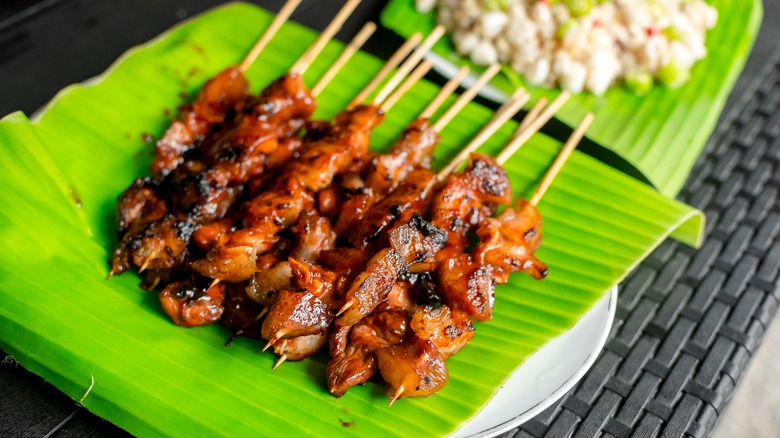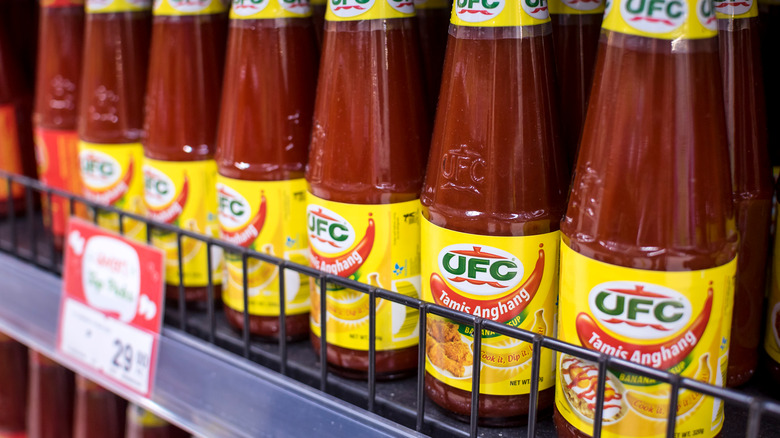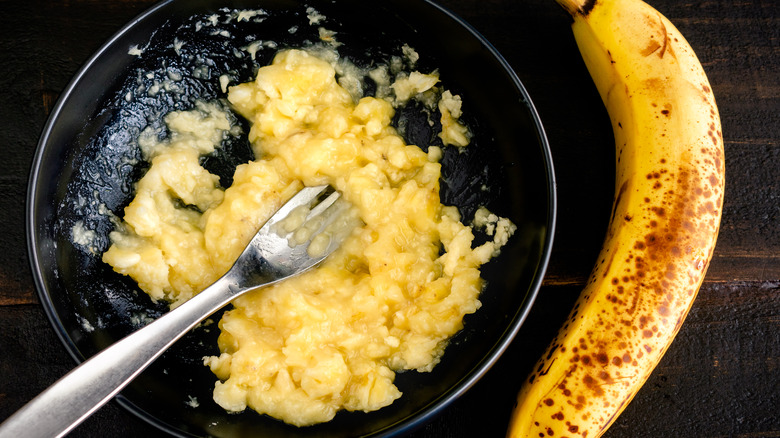Why Bananas Are So Important To Filipino BBQ
When it comes to Asian barbecue styles, there's a delicious landscape of distinctive regional flavors that will entice seasoned foodies and casual diners alike. Each country and culture has traditional dishes that define local cuisine — and Filipino BBQ is no different. The customary sweetness that is a trademark of Filipino BBQ comes from the use of banana ketchup in the marinade used to prepare meat. Many dishes and ingredients define Filipino cuisine, but banana ketchup is the secret sauce on every table and in every kitchen. This traditional cooking style is known for the smoky chargrilled flavor of the barbecue, which is enhanced by a sweet, caramelized flavor and texture.
Pinoy BBQ is usually cooked and served on skewers, and these grilled seafood and meat sticks are part of a wide range of popular Filipino street foods. Lemon-lime soda, soy sauce, and a native citrus fruit known as calamansi also go into the tenderizing, flavor-enhancing sauce that gives the cuisine its defining characteristics. Barbecue is an important element of community and social life in the Philippines, and it would not be the same without bananas. The story of how the fruit found its way into Filipino BBQ sauce is one of food scarcity, self-sufficiency, and culinary genius.
Banana ketchup: the sweeter, cheaper sauce
As a traditional American condiment and marinade, barbecue sauce is typically made with tomato paste as a key ingredient, among a host of other things that can vary by region. Due to the novelty of Americans present in Southeast Asia during World War II, ingredients imported to the Philippines from the U.S. were held in high regard. However, during and after WWII, tomatoes were not always easy to come by in the country, so an accessible replacement for the popular American ingredient had to be found. The fruity, flavorful, and widely available substitution was bananas, which are plentiful in Southeast Asia. A couple of Asian countries are still responsible for producing the most bananas in the world.
Banana ketchup became the new Filipino standard and a necessity in the family pantry. The blend of vinegar, sugar, spices, and native saba bananas resulted in a sweet and versatile condiment. While it had a somewhat different flavor profile from tomato ketchup, the similarities meant it could be used as a replacement in some of the same recipes. Naturally, it was integrated into BBQ grilling, combined with sodas like 7-Up, soy sauce, and calamansi to produce the defining marinade used to make Filipino BBQ. This origin story is a textbook example of quintessential cultural cohesion — an exchange of cuisines, the use of new ingredients in traditional cooking styles, and resourcefulness resulting in culinary innovation.
The mother of a revolutionary ingredient
The woman behind banana ketchup is María Orosa, a food scientist and humanitarian who sought to make the Philippines less dependent on imported foods. Her dream of a self-sustaining homeland led her to create the first iteration of banana ketchup sometime in the 1930s, adding a bit of red food coloring when the banana-vinegar-spice mash resulted in an unappetizing brownish color. But while the color had to be adjusted, the flavor and accessibility made the creation quick to spread. Mass production started in 1942, and bananas were already well on their way to becoming an integral part of the Filipino barbecue world.
María was a passionate and dedicated woman intent on uplifting her people with self-sufficient food practices, access to enhanced nutrition, and expanded knowledge of food cultivation and preservation. She was a trained food chemist who earned multiple degrees from the University of Washington before moving back to the Philippines. There she worked to feed her community and country, inventing a stove for rural families that could be used without electricity, new methods for canning and preserving local fruits, and even feeding internment camp prisoners during WWII. María crafted nutrient-dense rations and arranged for them to be smuggled to American prisoners of war and imprisoned Filipino citizens, saving countless lives as a result. Her compassionate and creative legacy survives in her ingenious sauce invention, and today banana ketchup is the pivotal ingredient that sets Filipino BBQ apart from the rest.



